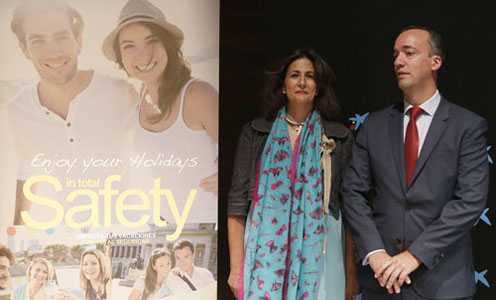Safe Tourism Plan 2015
Ministry of Home Affairs strengthens citizen security in tourist destinations with over 29,000 additional officers
News - 2015.6.19
The operational implementation of this plan is embodied in Operation Summer 2015, which the Ministry of Home Affairs will launch on 1 July.
Francisco Martínez explained that the Safe Tourism Plan includes a series of preventive measures aimed at increasing citizen security in tourist destinations, as well as on urban and inter-urban roads, and at train stations, ports, airports, hotels and camp sites. Furthermore, it provides for additional officers at summer shows and events involving large numbers of people.
In turn, the State Secretary for Tourism, Isabel Borrego, said that the high security levels offered by Spain have an undeniable effect on the country's competitiveness as a tourist destination.
Isabel Borrego stated that she believes that their perception of security influences tourists before, during and after they visit Spain, before going to say that this strength is fundamental to achieving and consolidating the extraordinary figures being posted by the country in terms of both inbound tourist arrivals and spending.
Over 29,000 additional officers to boost security at tourist destinations
The State Secretary for Security stressed that major tourist destinations will have an additional 11,961 Spanish National Police officers and 17,156 Spanish Guardia Civil officers this summer, who will endeavour to guarantee security for international tourists visiting Spain and Spanish citizens on their summer holidays, as well as to prevent unlawful acts and conduct.
Furthermore, Francisco Martínez stressed that the Safe Tourism Plan 2015 enhances the services offered to foreign tourists by increasing the number of Foreign Tourist Assistance Services (Spanish acronym: SATE) from the 14 in operation in 2013 to a total of 21. Francisco Martínez stressed that the service provided by these offices has received numerous awards, including the Excellence Award presented by the British Embassy to the Benidorm SATE and the Duque San Pedro de Galantino Award presented to the Spanish National Police by the Provincial Tourism Federation of Granada.
The Foreign Tourist Assistance Service (SATEs) provide services to those tourists who become the victim of crime in their own language, help them file an official crime report, provide assistance for the cancellation of credit cards or other documents and, if necessary, put them in touch with their consular authorities or with their families.
New technologies boost security
Francisco Martínez stressed that "Spain is positioning itself among the most innovative countries committed to smart security" and highlighted the "boost" given by the Ministry of Home Affairs to new information technologies. He particularly mentioned ALERTCOPS - a free mobile app that acts as a bidirectional channel between the citizen and the police forces through which any citizen who becomes the victim of or witness to a crime or risk situation can immediately ask for help or information via their smartphone. Furthermore, he announced that 20,000 posters and 200,000 leaflets (in Spanish and English) have been produced to raise awareness about this app. These posters and leaflets explaining how the app works began to be distributed throughout Spain this week.
As part of the commitment by the Ministry of Home Affairs to new technologies, Francisco Martínez highlighted the "Smart Borders" programme that connects the visa information, automated border control and advanced passenger information systems, as well as all operational databases. "In short", explained Francisco Martínez, "it is an essential tool for facilitating border passage by travellers that also strengthens control and security".
Francisco Martínez said that, "thanks to the 'smart borders' programme and the ALERTCOPS app, we are making it easier for tourists to travel, improving quality of service and meeting their information and crime reporting needs in real time. Technology", he said, "is enabling us to increase the feeling of security that citizens in this country enjoy".
Finally, he concluded his speech by recalling that, for the first time ever, Spain leads the tourism competitiveness index of the World Economic Forum and that the country has returned to third position (climbing back above China) in terms of the number of inbound tourists. "For this reason, all efforts by the Government of Spain - and this Safe Tourism Plan is a fine example of those efforts - are aimed at making Spain a global benchmark in security, coexistence and the quality of our services".





